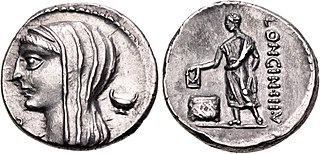Related Research Articles

The gens Cassia was a Roman family of great antiquity. The earliest members of this gens appearing in history may have been patrician, but all those appearing in later times were plebeians. The first of the Cassii to obtain the consulship was Spurius Cassius Vecellinus, in 502 BC. He proposed the first agrarian law, for which he was charged with aspiring to make himself king, and put to death by the patrician nobility. The Cassii were amongst the most prominent families of the later Republic, and they frequently held high office, lasting well into imperial times. Among their namesakes are the Via Cassia, the road to Arretium, and the village of Cassianum Hirpinum, originally an estate belonging to one of this family in the country of the Hirpini.

The gens Licinia was a celebrated plebeian family at ancient Rome, which appears from the earliest days of the Republic until imperial times, and which eventually obtained the imperial dignity. The first of the gens to obtain the consulship was Gaius Licinius Calvus Stolo, who, as tribune of the plebs from 376 to 367 BC, prevented the election of any of the annual magistrates, until the patricians acquiesced to the passage of the lex Licinia Sextia, or Licinian Rogations. This law, named for Licinius and his colleague, Lucius Sextius, opened the consulship for the first time to the plebeians. Licinius himself was subsequently elected consul in 364 and 361 BC, and from this time, the Licinii became one of the most illustrious gentes in the Republic.
The gens Terentia was a plebeian family at ancient Rome. Dionysius mentions a Gaius Terentius Arsa, tribune of the plebs in 462 BC, but Livy calls him Terentilius, and from inscriptions this would seem to be a separate gens. No other Terentii appear in history until the time of the Second Punic War. Gaius Terentius Varro, one of the Roman commanders at the Battle of Cannae in 216 BC, was the first to hold the consulship. Members of this family are found as late as the third century AD.
The gens Octavia was a plebeian family at ancient Rome, which was raised to patrician status by Caesar during the first century BC. The first member of the gens to achieve prominence was Gnaeus Octavius Rufus, quaestor circa 230 BC. Over the following two centuries, the Octavii held many of the highest offices of the state; but the most celebrated of the family was Gaius Octavius, the grandnephew and adopted son of Caesar, who was proclaimed Augustus by the senate in 27 BC.

The gens Minucia was an ancient Roman family, which flourished from the earliest days of the Republic until imperial times. The gens was apparently of patrician origin, but was better known by its plebeian branches. The first of the Minucii to hold the consulship was Marcus Minucius Augurinus, elected consul in 497 BC.
The gens Apronia was a plebeian family at ancient Rome throughout the history of the Republic and into imperial times. The first member of the gens to achieve prominence was Gaius Apronius, tribune of the plebs in 449 BC. None of the Apronii obtained the consulship until the first century AD.

The gens Caecilia was a plebeian family at ancient Rome. Members of this gens are mentioned in history as early as the fifth century BC, but the first of the Caecilii who obtained the consulship was Lucius Caecilius Metellus Denter, in 284 BC. The Caecilii Metelli were one of the most powerful families of the late Republic, from the decades before the First Punic War down to the time of Augustus.
The gens Caelia was a plebeian family at ancient Rome. The nomen Caelius is frequently confounded with Coelius and Caecilius, with some individuals referred to as Caelius in manuscripts, while appearing as Coelius or Coilius on coins. Although the Caelii asserted their great antiquity, none of them attained any of the higher offices of the Roman state until the praetorship of Publius Caelius in 74 BC, and the first of this gens who obtained the consulship was Gaius Caelius Rufus in AD 17. The emperor Balbinus was a descendant of the Caelii.

The gens Maria was a plebeian family of Rome. Its most celebrated member was Gaius Marius, one of the greatest generals of antiquity, and seven times consul.

The gens Sergia was a patrician family at ancient Rome, which held the highest offices of the Roman state from the first century of the Republic until imperial times. The first of the Sergii to obtain the consulship was Lucius Sergius Fidenas in 437 BC. Despite long and distinguished service, toward the end of the Republic the reputation of this gens suffered as a result of the conspiracy of Catiline.

The gens Considia was a plebeian family at ancient Rome. The Considii came to prominence in the last century of the Republic, and under the early Empire, but none of them rose any higher than the praetorship.
The gens Fannia was a plebeian family at ancient Rome, which first appears in history during the second century BC. The first member of this gens to attain the consulship was Gaius Fannius Strabo, in 161 BC.
The gens Fufia was a plebeian family at ancient Rome. The gens does not appear to have been of great antiquity, and only appears in history toward the beginning of the first century BC.
The gens Lucceia, occasionally Luceia or Luccia, was a plebeian family at Rome, which flourished during the final century of the Republic and under the early Empire.

The gens Munatia was a plebeian family at Rome. Members of this gens are first mentioned during the second century BC, but they did not obtain any of the higher offices of the Roman state until imperial times.
The gens Oppia was an ancient Roman family, known from the first century of the Republic down to imperial times. The gens may originally have been patrician, as they supplied priestesses to the College of Vestals at a very early date, but all of the Oppii known to history were plebeians. None of them obtained the consulship until imperial times.
The gens Peducaea, occasionally written Paeducaea or Peducea, was a plebeian family at ancient Rome. Members of this gens occur in history from the end of the second century BC, and from then to the time of Antoninus Pius, they steadily increased in prominence. The first of the Peducaii to obtain the consulship was Titus Peducaeus in 35 BC.

The gens Publicia, occasionally found as Poblicia or Poplicia, was a plebeian family at ancient Rome. Members of this gens are first mentioned in history during the period following the First Punic War, and the only one to achieve the consulship was Marcus Publicius Malleolus in 232 BC.
The gens Seia was a minor plebeian family of equestrian rank at ancient Rome. Members of this gens are first mentioned in the time of Cicero, and a few of them held various magistracies under the late Republic and into imperial times.
The gens Titinia was a minor plebeian family at ancient Rome. Members of this gens are mentioned as early as the time of the decemvirs, but only a few held any magistracies, and none of them ever attained the consulship.
References
- 1 2 3 Dictionary of Greek and Roman Biography and Mythology , William Smith, Editor.
- ↑ Marcus Tullius Cicero, Epistulae ad Familiares, xii. 25.
- ↑ Lucius Cassius Dio Cocceianus, Roman History, xlviii. 21.
- ↑ Marcus Tullius Cicero, In Verrem , i. 57.
- ↑ Marcus Tullius Cicero, In Verrem , Act. i. 10.; Epistulae ad Atticum, i. 1, 13.
- ↑ Quintus Asconius Pedianus, In Toga Candida , p. 82.
- ↑ Gaius Sallustius Crispus, The Conspiracy of Catiline, 47.
- ↑ Appianus, Bellum Civile, ii. 5.
- ↑ Quintus Asconius Pedianus, in Cic. Mil., 40, 54 (ed. Orelli).
- ↑ Quintus Asconius Pedianus, in Cic. Mil., 37.
![]() This article incorporates text from a publication now in the public domain : Smith, William, ed. (1870). Dictionary of Greek and Roman Biography and Mythology .
This article incorporates text from a publication now in the public domain : Smith, William, ed. (1870). Dictionary of Greek and Roman Biography and Mythology .{{cite encyclopedia}}: Missing or empty |title= (help)